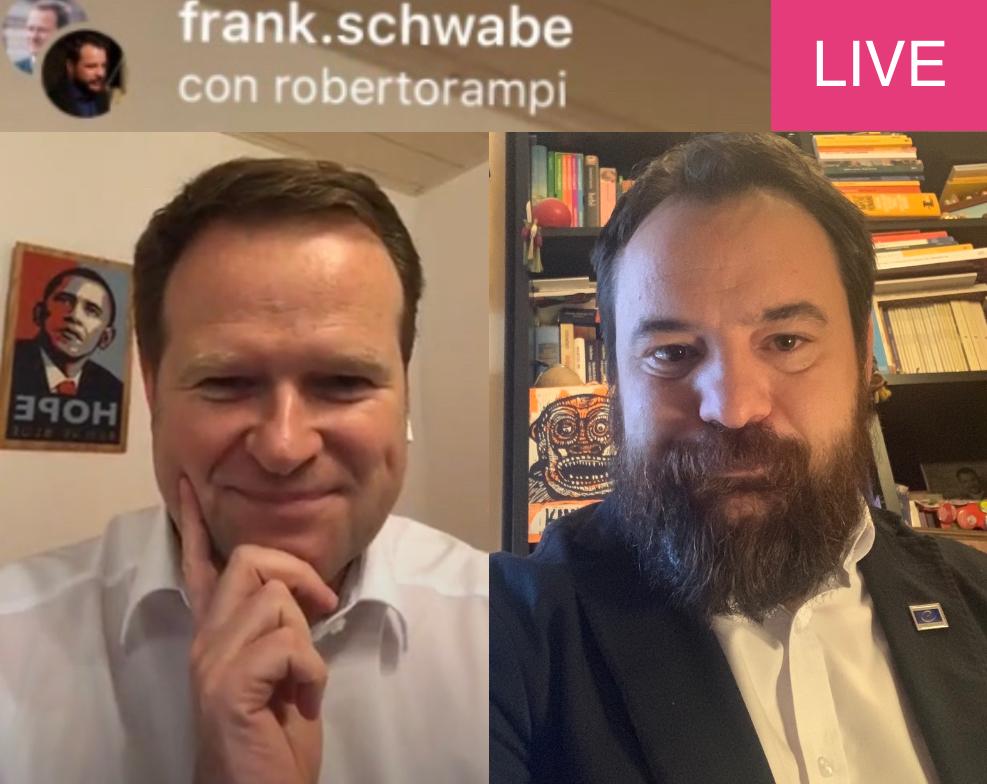The COVID-19 emergency has changed the vocabulary and the priorities of national and international politics. Terms like “quarantine”, “social distancing” or “pandemic” have now become part of our daily wordbook. However, there is still a need to familiarise ourselves with other equally important terms such as “unity” and “solidarity”, which are distinctive traits of the Council of Europe and the European Union. Wednesday 15 April 2020, Italian Senator Roberto Rampi, and Member of the German Bundestag, Frank Schwabe, took this opportunity and held a live streaming on Instagram to reassure their followers that the work of the Parliamentary Assembly of the Council of Europe (PACE) and of the Socialists, Democrats and Greens Group – to which they belong – continues.
Many issues were addressed during the live streaming, from the crisis management in Germany and Italy to the compelling urgency of working together towards a more ecological and egalitarian post-coronavirus society. In this regard, the most vulnerable groups to the crisis were discussed such as the refugees at the gate of Europe – to whom the EU must prove a concrete approach – and the victims of propaganda and pandemic mismanagement in non-democratic countries such as Turkey, Russia and Kazakhstan. And it is precisely through transparency and promptness in communication and managing of the health emergency crisis that democratic countries must act, regardless of the fascination for the so-called “Wuhan model”.
The governments of illiberal democracies, such as Poland and Hungary, are also misusing the outbreak for political purposes and, as Schwabe pointed out, it will be up to the socialists to show that the progressive front can stem this situation. In this framework, the help of the European Union is fundamental and although the EU has no competence in health matters within the individual Member States, it can provide systematic aid plans and instruments. Rampi has also tackled the current Eurobonds debate, which is dividing the Italian and German public opinion on the effective help of the EU’s response and which puts the already difficult coexistence between the different Member States to the test. Schwabe reiterated that this unprecedented crisis should instead help us to better understand the measures that the EU is putting in place to cope with the crisis; in an increasingly interconnected political and geographic space, it is not enough to close the borders to avoid the contagion.
This is a very challenging situation, particularly in Lombardy – Senator Rampi’s region – where a shortage of health facilities and adequate testing tools has occurred. The EU and the countries of the Council of Europe must look at the Italian context to understand the spread of the virus and contain the pandemic. According to Senator Rampi, however, there is a solution, and it is already under discussion in the PACE Committee on Culture, Science, Education and Media. Such solution relies on “people’s right to know”, a fundamental right that should provide the citizens and the political world with the instruments to understand what is happening around us.
The PACE is working on this and many other issues, also in collaboration with the World Health Organisation, to ensure more democracy and discussion around the pandemic which is affecting everyone. As Senator Rampi reassured, we are also working for those sectors which have been heavily damaged by the COVID-19 crisis – in particular the cultural and creative sector – to rebuild an idea of the future after the emergency.
Paola Gaffurini
Advocacy Officer at the Open Dialogue Foundation
Asia Jane Leigh contributed to this article

